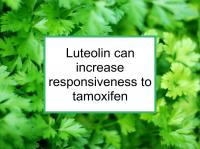Luteolin has been shown to induce apoptosis and reduce proliferation in multidrug resistant hormone receptor positive (ER+/PR+) breast cancer cells. In fact, luteolin has been shown increase the anti-cancer effects of the chemotherapy drugs doxorubicin and paclitaxel.
Now a new study has reported that luteolin can sensitize tamoxifen-resistant breast cancer cells to tamoxifen, thereby improving its treatment effects.
Latest research finds luteolin can enhance tamoxifen treatment
The study referenced at the beginning of this news story was designed to identify the oncogenic molecules in human breast cancer cells that are inhibited by luteolin. The authors demonstrated that the level of cyclin E2 (CCNE2) mRNA was 4.9-fold higher in cancer cells than in normal paired tissue samples. In addition, relatively high levels of CCNE2 protein expression were found in tamoxifen-resistant (TAM-R) MCF-7 breast cancer cells.
In fact, the authors found that the level of CCNE2 protein expression in tamoxifen-resistant cells was inhibited by luteolin treatment, both in the presence or absence of tamoxifen. Combined treatment with tamoxifen and luteolin sensitized the TAM-R cells to tamoxifen. The authors conclude that luteolin might be used as a chemosensitizer to target the expression level of CCNE2 and also overcome tamoxifen resistance in breast cancer patients.
Please see our article on tamoxifen for more information on how to optimize treatment with tamoxifen and reduce its side effects.
